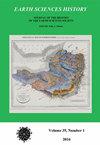GENDER, PLACE AND THE VALIDATION OF KNOWLEDGE: THE TRANSNATIONAL DEBATE ABOUT THE EFFECTS OF THE CHILEAN EARTHQUAKES OF 1822 AND 1835 ON LAND ELEVATION
IF 0.6
4区 哲学
Q4 GEOSCIENCES, MULTIDISCIPLINARY
引用次数: 0
Abstract
This article focuses on the transnational debate on the effects of earthquakes on land elevation after the seismic events in Chile in 1822 and 1835. It explores two main ideas. First, it examines how the Chilean territory became a transnational testing ground for geological theories about land elevation in the 1820s and 1830s. Second, it explores how social features such as gender, place and a scientist’s personal connections affected the validation of scientific knowledge. It introduces a wide network of actors, from well-known figures in the geological field, such as Charles Lyell, Charles Darwin and George B. Greenough, to lesser-known actors, such as Peruvian mineralogist Mariano de Rivero and British travel writer Maria Graham. By doing so, this paper addresses the social dimension of science-making, highlighting the asymmetries of power in knowledge circulation in global scientific networks in the mid-nineteenth century.性别、地点和知识的验证:关于1822年和1835年智利地震对陆地高程影响的跨国辩论
本文重点讨论了1822年和1835年智利地震事件后,关于地震对陆地高程影响的跨国辩论。它探讨了两个主要观点。首先,它考察了智利领土是如何在19世纪20年代和19世纪30年代成为陆地高程地质理论的跨国试验场的。其次,它探讨了性别、地点和科学家的个人关系等社会特征如何影响科学知识的验证。它介绍了一个广泛的演员网络,从地质领域的知名人物,如Charles Lyell、Charles Darwin和George B.Greenough,到不太知名的演员,如秘鲁矿物学家Mariano de Rivero和英国旅行作家Maria Graham。通过这样做,本文探讨了科学制造的社会层面,强调了19世纪中期全球科学网络中知识流通的权力不对称。
本文章由计算机程序翻译,如有差异,请以英文原文为准。
求助全文
约1分钟内获得全文
求助全文
来源期刊

Earth Sciences History
GEOSCIENCES, MULTIDISCIPLINARY-HISTORY & PHILOSOPHY OF SCIENCE
CiteScore
1.00
自引率
0.00%
发文量
1
审稿时长
>12 weeks
期刊介绍:
Earth Sciences History promotes and publishes historical work on all areas of the earth sciences – including geology, geography, geophysics, oceanography, paleontology, meteorology, and climatology.
The journal honors and encourages a variety of approaches to historical study: biography, history of ideas, social history, and histories of institutions, organizations, and techniques.
Articles are peer reviewed.
 求助内容:
求助内容: 应助结果提醒方式:
应助结果提醒方式:


